Pan Roasted Korean Sweet Potato
Roasted Korean sweet potato, gun-goguma, with pan-roasting method! With this recipe you can easily replicate the subtle char on the skin and the caramelization of goguma that you would find from a Korean street food truck. It’s very easy!
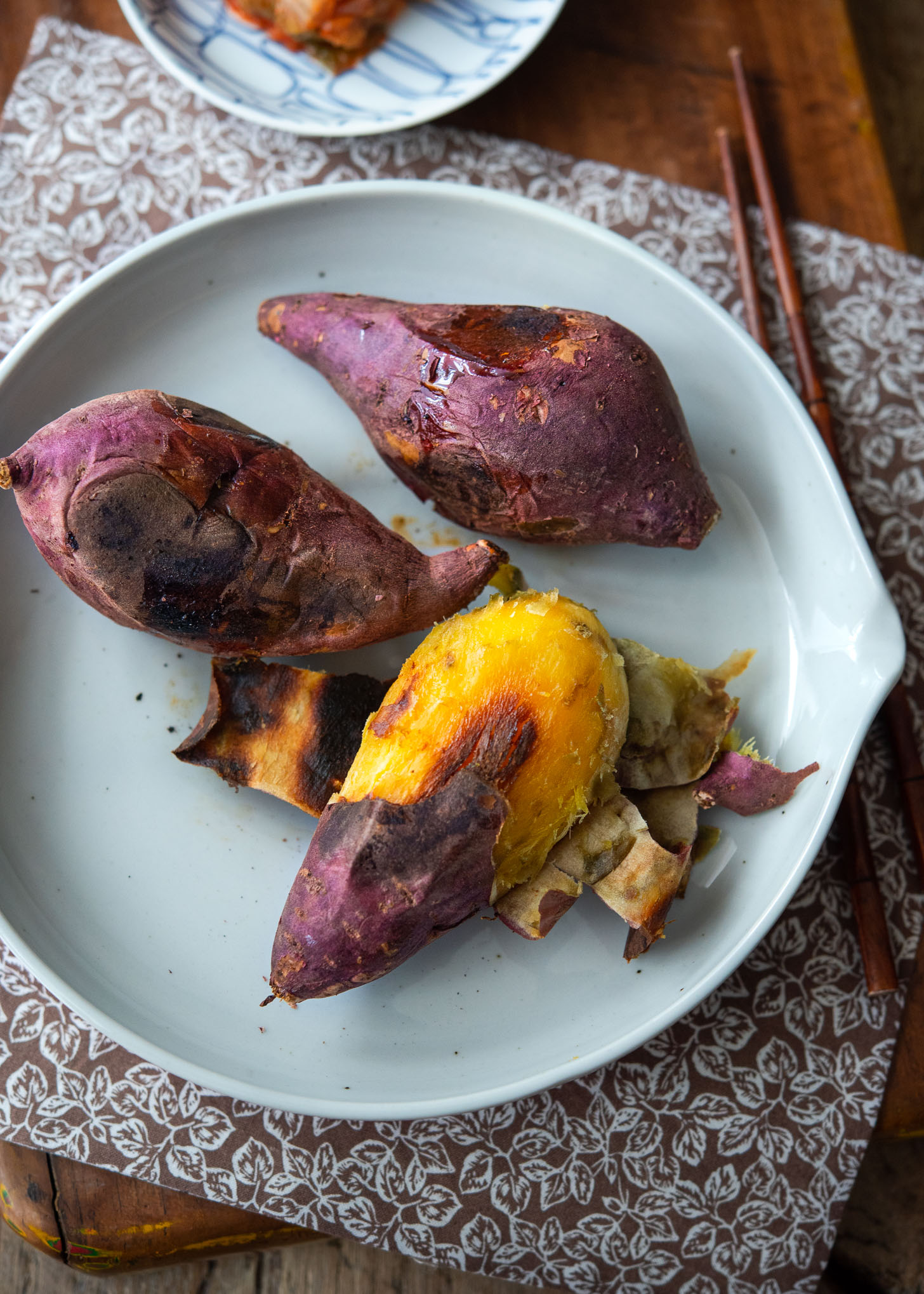
Korean sweet potatoes, called goguma (고구마) are delicious, healthy carbohydrates that will keep you full for hours. Snacks made with this sweet potato are very popular among all Koreans.
Growing up in Korea, the roasted Korean sweet potato (gun-goguma, 군고구마) was one of my favorite snacks. These slowly roasted or baked Korean sweet potatoes are great all year round but are especially popular during the winter. You will find many Gun-goguma venders everywhere in Korea selling freshly baked (roasted) sweet potato. They are baked inside a wood fired oven or an oven that uses hot pebbles inside.
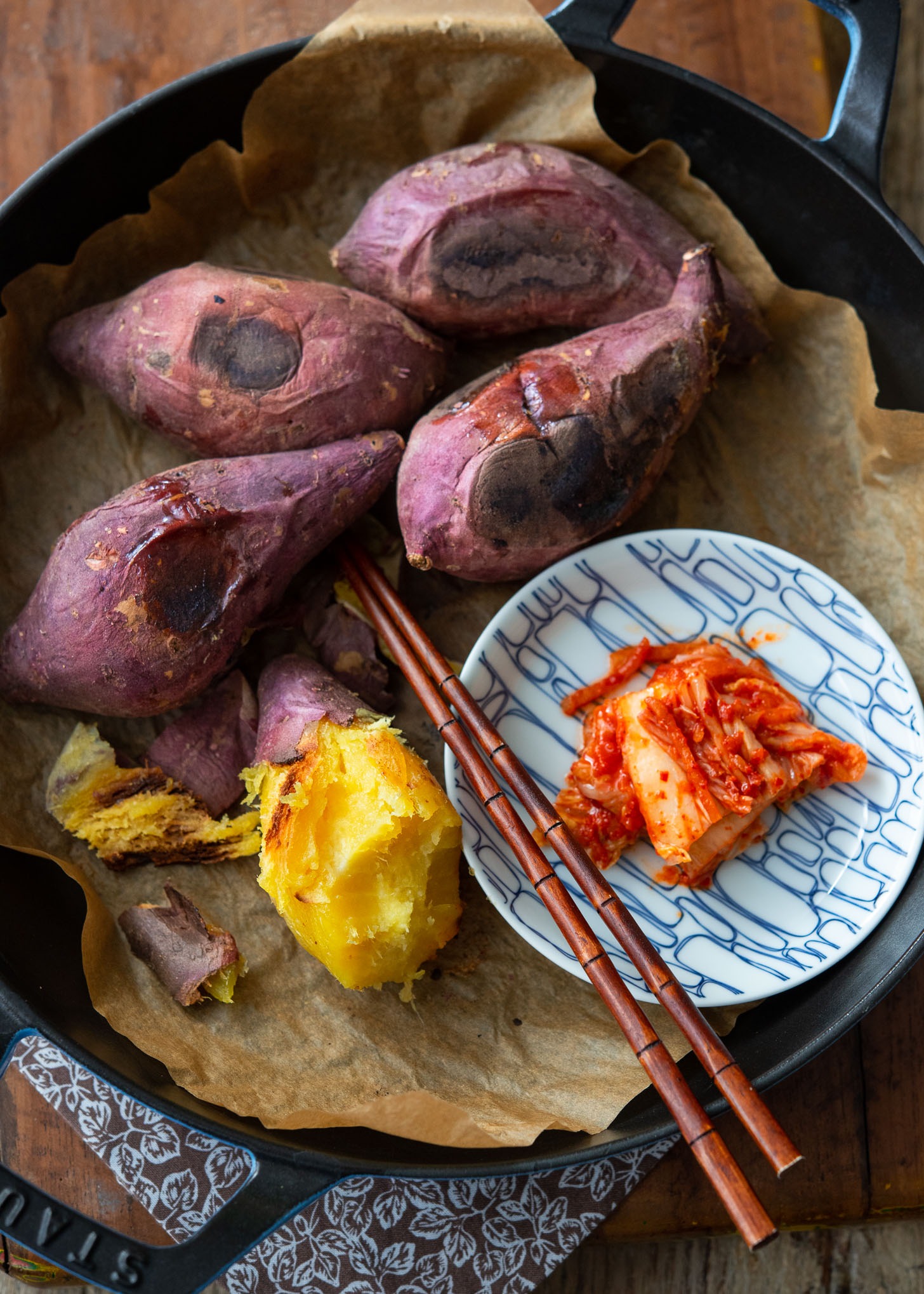
The burnt, sweet aroma coming out of those ovens is just irresistible, so I always end up giving in and buying a bagful of them. They are roasted until soft and caramelized on the inside with a crispy and charred purple skin on the outside. It’s naturally sweet and when roasted properly, it almost tastes like honey—so good!
Obviously, the best way to make Korean goguma would be by roasting them in a wood-fired or hot pebble oven just like the Korean street food trucks use, but not everyone has such ovens at home in their kitchen.
The good news is that there are ways to cook sweet potatoes just like the wood-fired roasted potatoes. You can mimic the similar taste, texture, and aroma. And it is so simple!
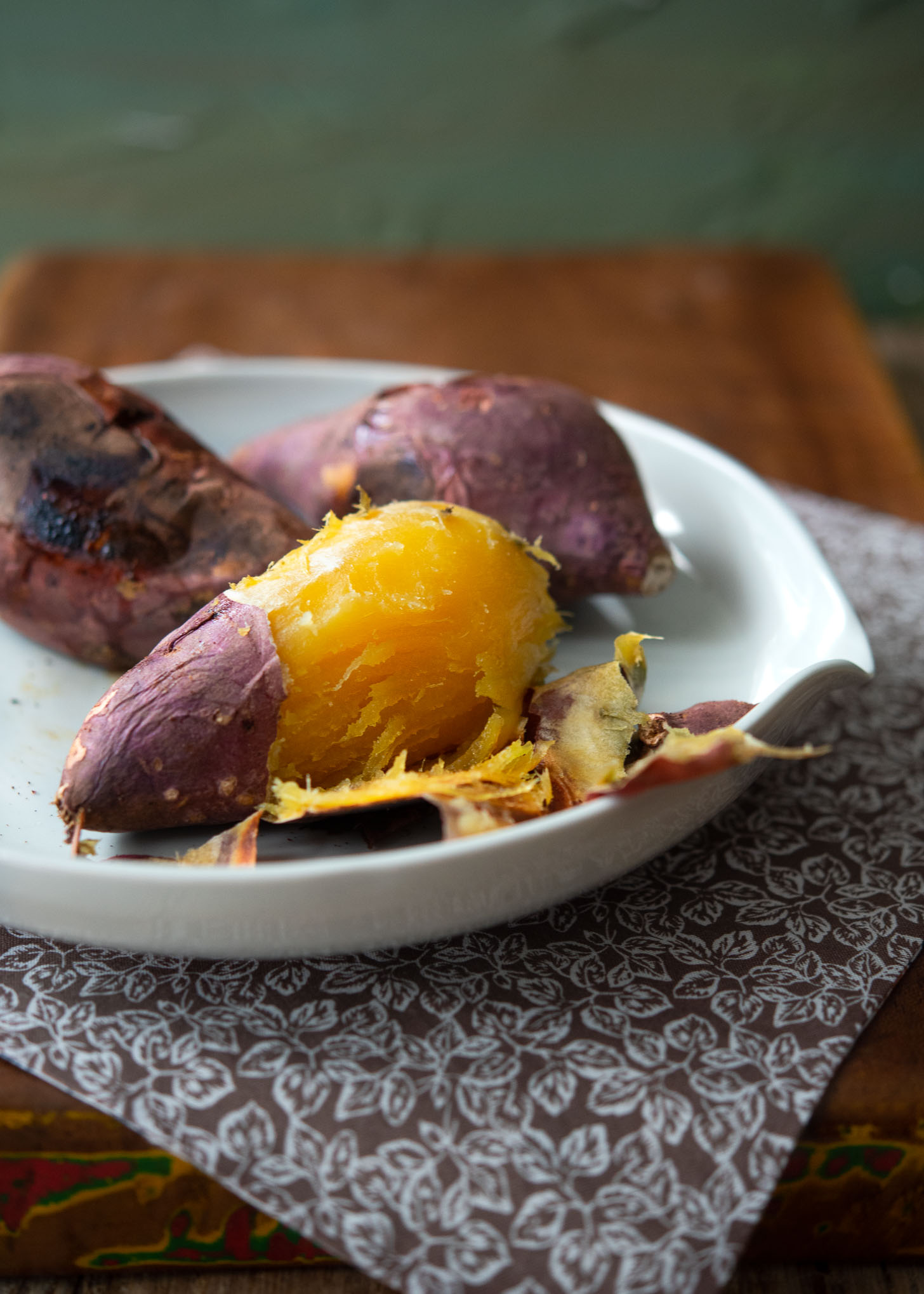
Oven baked vs pan roasted
Oven baked Korean sweet potatoes are more common, but I absolutely recommend pan roasting instead of baking them in a traditional oven.
I used to bake Korean sweet potatoes in the oven but I often found the inside of the sweet potato becomes slightly dry and the caramelization was not as great. Although the oven-baked method is still better than boiling or steaming, the flavor still doesn’t measure up to the old fashioned method.
So how is pan-roasted sweet potato better?
When you pan roast the sweet potatoes on the stovetop, covered, with a layer of parchment paper over low heat (if your heat source is not as strong, use medium-low heat), the steam that’s trapped inside the pan keeps the flesh of the sweet potato very moist. It makes the flesh very moist and honey-like.
See my pan grilled mackerel that uses parchment paper. You will see the beautifully seared crispy mackerel fish (without the fish smell while cooking).
Thoroughly roasting at a low and steady temperature increases the enzymatic action in the sweet potato, breaking the starches down into sugar–thus making the sweet potato sweeter.
In addition, the direct contact between the sweet potato and the hot pan causes the natural sugars from the sweet potato to ooze out and caramelize, forming thin sugar threads over the skin. Besides improving the taste, it also creates the charred look on the skin just as you would get from a wood-fired or hot pebble oven.
All you need is a dutch oven (braiser pan, heavy bottom pan, or cast iron skillet), and a piece of parchment paper. It’s so easy and simple but the result is great!
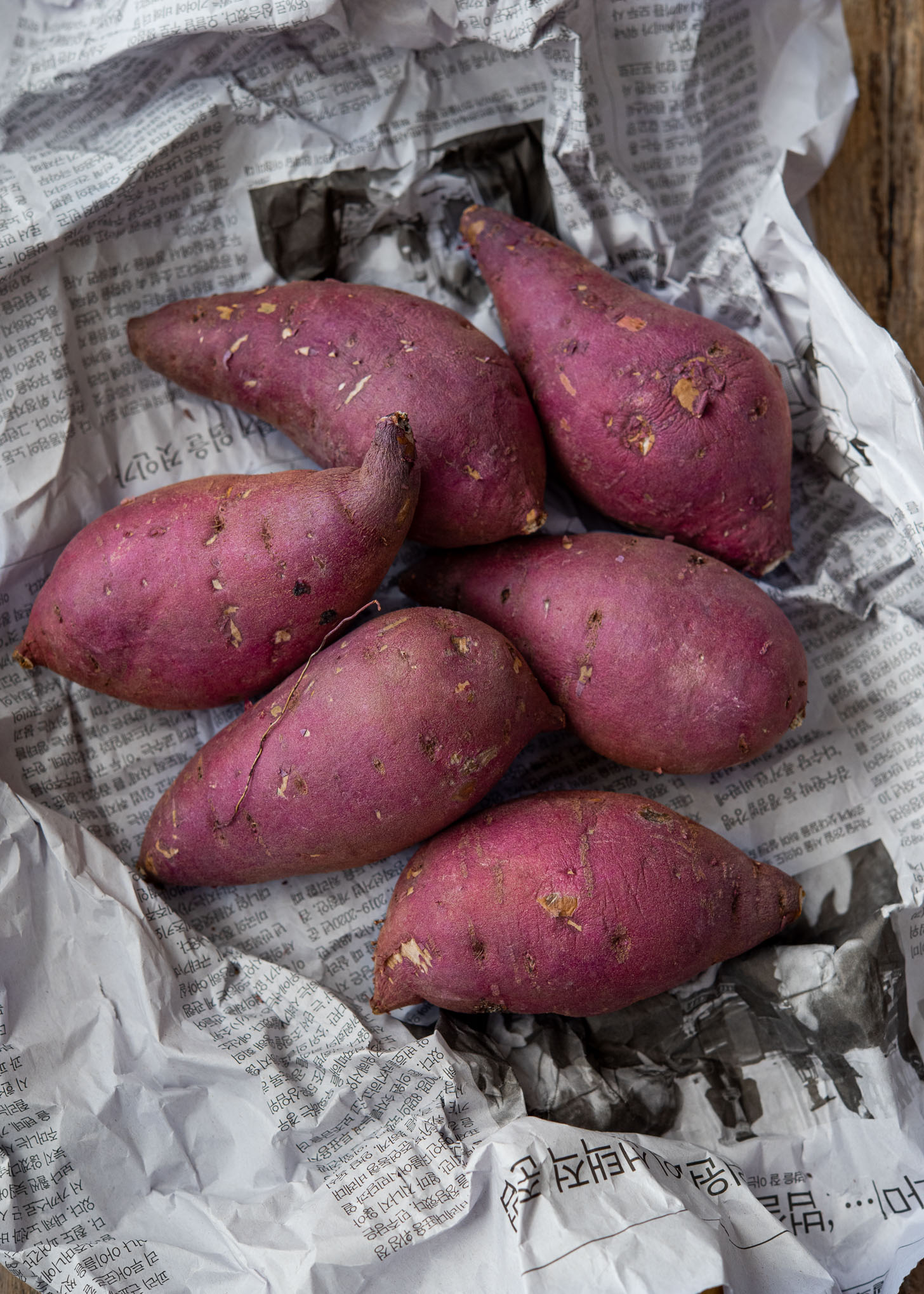
Varieties of Korean sweet potatoes
- Bam goguma 밤고구마 (Chestnut sweet potatoes): These have a reddish purple hue on the skin with white flesh inside. However, when roasted the inside turns golden yellow and has a chestnut-like flavor and texture (the name “bam” means chestnut). These sweet potatoes are denser and drier in texture, similar to Japanese sweet potatoes.
- Honey Sweet Potatoes (Kkul- Goguma 꿀고구마): This type of sweet potato has a deep yellow interior and tends to be thinner and longer in shape. They taste extremely sweet and have a higher moisture content compared to other varieties. These have have a reddish, purple skin as well.
- Pumpkin Sweet Potatoes (Hobak-Goguma 호박고구마): These sweet potatoes have a juicer texture than the chestnut sweet potatoes. They have a light brown skin and a more orange-colored flesh. The color turns golden brown and with a creamy texture once cooked.
Where to buy them: You can find them in Korean grocery stores and most Asian groceries. They’re also called Japanese sweet potatoes, Asian sweet potatoes, and Korean yams. Trader Joe’s and Whole Foods often carry these sweet potatoes in late fall or winter. Look for ones that have a smooth skin and feel firm to the touch. Try to get them in similar sizes so that they can cook evenly. Avoid the ones that are very large and thick, since it will take forever to roast.
Korean sweet potatoes vs American sweet potatoes
Korean sweet potatoes usually have purplish skin on the outside and yellow or white flesh inside with denser, drier, and starchier texture depending on the variety. American sweet potatoes have an orange flesh with high water content. Korean varieties tend to be much sweeter in taste. Both are great for roasting or making desserts.
How to pan roast Korean sweet potatoes
Before you get started, consider curing the potatoes for a few days to get the best result.
Curing sweet potatoes: While it’s tempting to consume the purchased sweet potatoes immediately (especially if they are just harvested), I recommend to let them cure first. All you have to do is let them sit at room temperature for 1-2 weeks.
Place them on top of newsprint inside a cardboard box, avoiding any additional moisture. During the curing process, the starches inside the sweet potatoes convert to sugars, allowing the sweet potatoes to become sweeter and more moist when cooked.
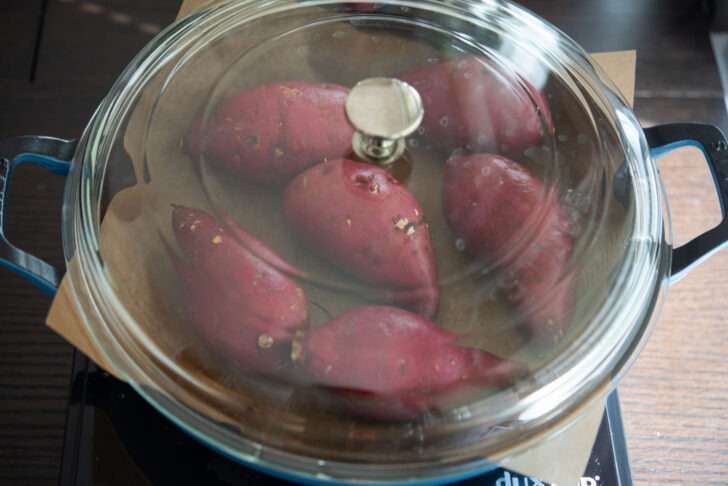
Rinse Korean sweet potatoes and place them in a braiser pan or any heavy bottom pan lined with a parchment paper. Make sure your sweet potatoes are placed in a single layer without overlapping.
Cover with a lid and place on the stovetop over low heat (if your heat source is not as strong, use medium-low heat); roast for 40-60 minutes depending on their size and thickness. Turn your sweet potatoes every 20 minutes to the other side to roast evenly.
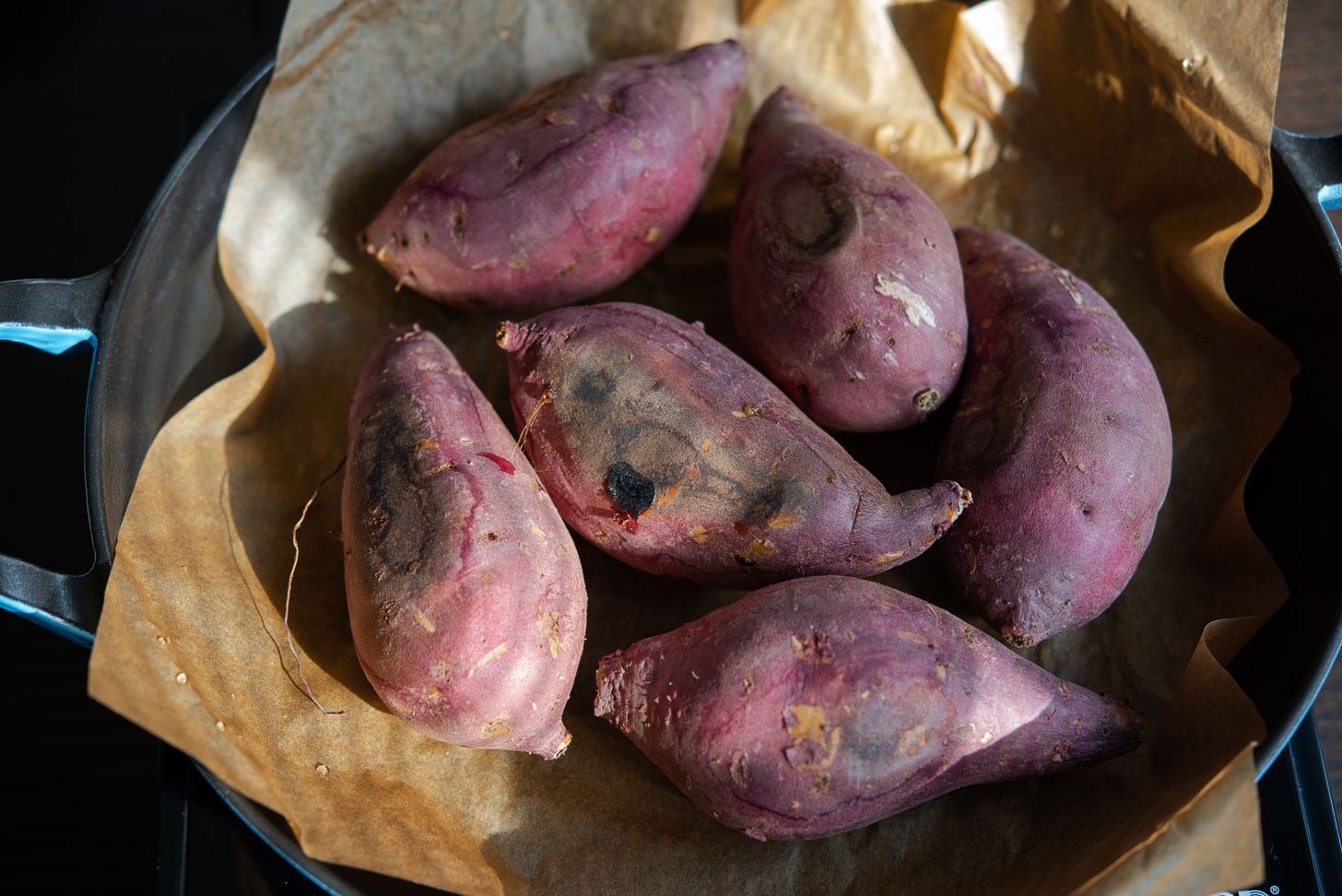
The sweet potatoes are done cooking when the skin shows a slightly charred look and the natural sugar is released and caramelized.
When lifted, you will see a sticky residue on the surface of the potatoes, in the form of strands of sugar thread.
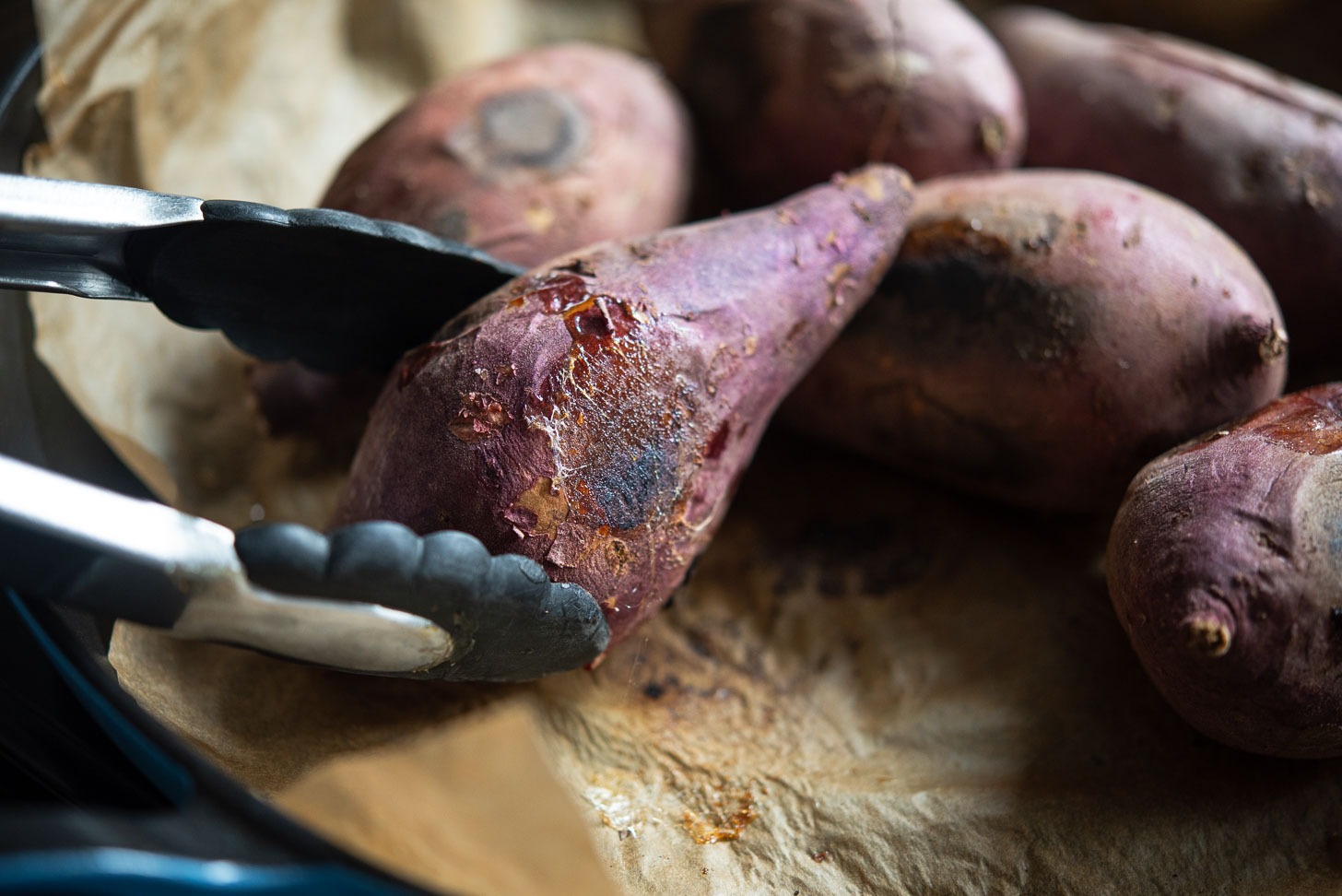
To check for doneness, poke the sweet potato with a chopstick or toothpick. If it goes in very softly without any resistance, they are done.
Using oven gloves, remove the sweet potatoes from the pan and serve hot. Be careful! They will be very hot.
Goguma feat kimchi (serving suggestion)
In Korea, these roasted sweet potatoes are often served with kimchi. The combination of sweet and savory is pleasing and very tasty. I recommend that you give it a try. Enjoy!
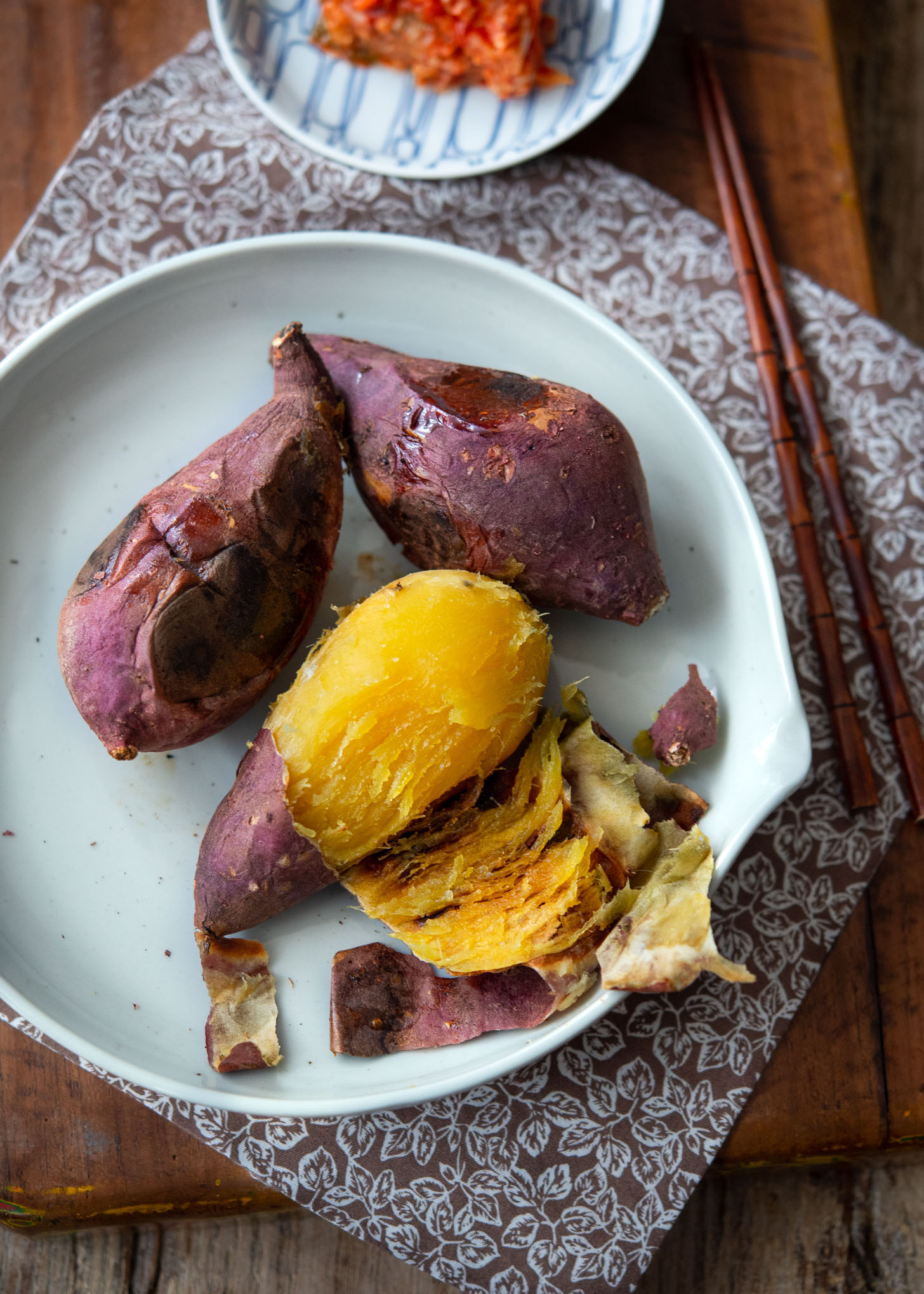
More Korean snack recipes
If you are looking for a healthy, easy to make Korean snack, try some of these recipes:
- Curry Kimchi Pancakes
- Root Vegetable Tempura (Yachae Tuigim)
- Crispy Spinach Pancakes
- Sweet Potato Rice Donuts
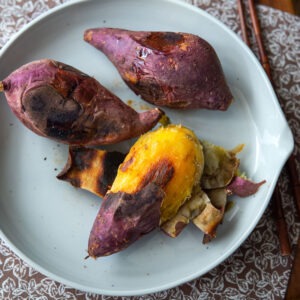
Pan Roasted Korean Sweet Potato (Gun-Goguma)
Ingredients
- 2 1/4 lb Korean sweet potatoes, See note below
Equipment
- braiser pan or heavy bottom pan
Instructions
- Rinse Korean sweet potatoes and place them in a braiser pan or any heavy bottom pan lined with a parchment paper. Make sure your sweet potatoes are placed in a single layer without overlapping.
- Cover with a lid and place on the stovetop over low heat (if your heat source is not as strong, use medium-low heat); roast for 40-60 minutes depending on their size and thickness. Turn your sweet potatoes every 20 minutes to the other side to roast evenly.
- The sweet potatoes are done cooking when the skin shows a slightly charred look and the natural sugar is released and caramelized. When lifted, you will see a sticky residue on the surface of the potatoes, in the form of strands of sugar thread.
- To check for doneness, poke the sweet potato with a chopstick or toothpick. If it goes in very softly without any resistance, they are done. Using oven gloves, remove the sweet potatoes from the pan and serve hot. Be careful! They will be very hot.Serving suggestion: In Korea, these roasted sweet potatoes are often served with kimchi. The combination of sweet and savory is pleasing and very tasty. I recommend that you give it a try. Enjoy!

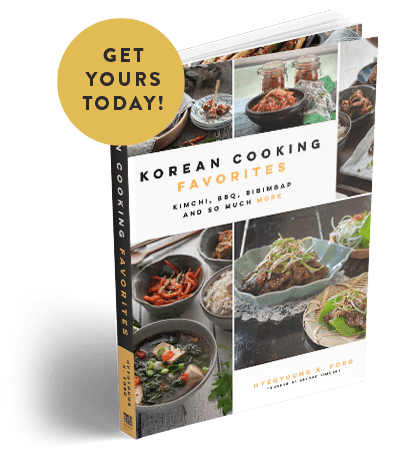
Are these potatoes similar to the Japanese Sweet potatoes, Satsumo-imo?
I will have to try your pan roasted method.
Yes, they are.
Thank you! I tried two oven methods. One wrapped in foil baked at 325° and one bare roasted at 385°. I preferred the one wrapped in foil, but both were very good. So sweet and soft inside.
Looking forward to the your pan method.
Hi, I was very excited to see this pan roasted sweet potato recipe. And it works! I’ve also cooked sweet potatoes in the oven and thought that was my only option. Initially, I put a piece of parchment that covered the bottom but realized it was too small and it started to burn. So I put down a much larger piece to poke out of the lid (like your picture) and that kept the steam inside the pan. I also turned the temp to low. I used a cast iron pan. I cooked three large sweet potatoes (only choice at the time) and turned it every 20 min like you said. Beautiful caramelization. Next time I go to the Korean market, I will get the small sweet potatoes. Thank you for posting this recipe! p.s. and I tried it with kimchi and you are right! it is really good together. a nice balance.
I’m glad that it worked for you. I think turning the heat to low is a better idea. I used a portable induction stove and my heat was not as strong. I am going to update it. Thanks for you comment!